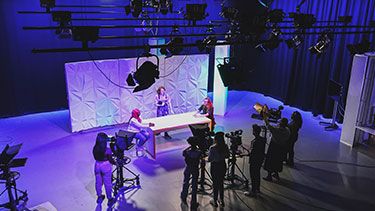Semester 1
Academic English
This module focuses on speaking and listening, reading and vocabulary, writing and grammar, and academic writing. The aim is to build your confidence in communication.
Numeracy Skills
You will gain basic skills in counting, solving number problems, measuring, estimating, sorting, noticing patterns, and adding and subtracting numbers.
Creative Workshop
The module will help you broaden your art, design and media skills and challenge your thinking through media experimentation and manipulation. You will be introduced to the basic studio workshop and materials so you can start producing a personal portfolio of work.
Seminar Sessions (Employability)
During this module, you will participate in BCU’s Graduate+. This employability scheme is designed to help you grow as a future graduate and prepare you for your individual career aspirations. Activities include volunteering, part-time work, and joining a society/team.
Semester 2
Interactive Learning Skills and Communication
Throughout this module, you will learn the academic skills needed for success at a UK university, such as:
- Time management
- Public speaking techniques
- Appropriate language styles
- Professional communication and presentation
- Researching and referencing techniques.
Numerical Techniques 1
This module will introduce you to basic mathematics and mathematical applications – including equations, algebraic problems and trigonometry.
Critical Thinking
You will be introduced to the fundamentals of critical thinking. You will learn how to examine and comment on components of an argument, so that you can develop a structured and analytical response.
Composition and Style
This module will define the core principles of effective academic writing, including:
- How to argue a position coherently and appropriately
- Distinguishing between descriptive and analytic writing
- Identifying academic systems of researching and referencing.
Semester 3
Mass Communications
This module will introduce you to the core concepts and principles relevant to mass communications, including some of the major theories.
Design Concepts
This module will introduce you to design, the importance of design and the fundamentals of technical drawing.
ICT Skills
This module will introduce you to the concepts of ICT skills, including applications and reporting mechanisms.
Globalisation
You will explore how the concept of globalisation has evolved, looking at:
- The economic, political, technological and social forces involved
- Local/regional beliefs that become global.

